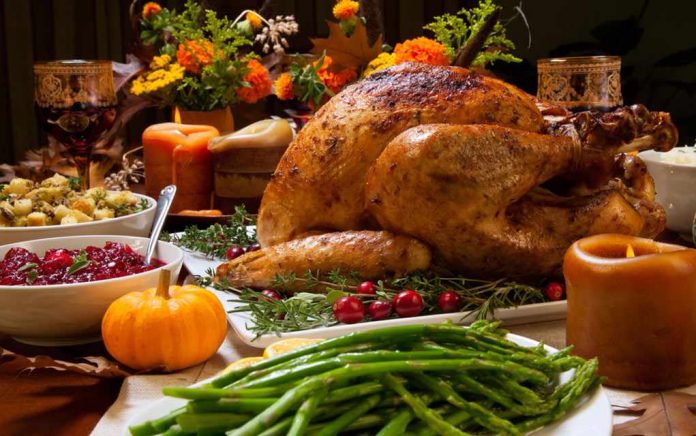Feasting with family is part of many holiday celebrations. Follow these simple tips to help prevent food poisoning, or foodborne illness, during the holidays.
- Cook food thoroughly. Meat, chicken, turkey, seafood, and eggs can carry germs that cause food poisoning. Use a food thermometer to ensure these foods have been cooked to a safe internal temperature. Roasts, chops, steaks, and fresh ham should rest for 3 minutes after you remove them from the oven or grill.
- Keep food out of the “danger zone.” Bacteria can grow rapidly in the danger zone between 40°F and 140°F. After food is cooked, keep hot food hot and cold food cold. Refrigerate or freeze any perishable food within 2 hours. The temperature in your refrigerator should be set at or below 40°F and the freezer at or below 0°F.
- Use pasteurized eggs for dishes containing raw eggs. Salmonella and other harmful germs can live on both the outside and inside of normal-looking eggs. Many holiday favorites contain raw eggs, including eggnog, tiramisu, hollandaise sauce, and Caesar dressing. Always use pasteurized eggs when making these and other foods made with raw eggs.
- Do not eat raw dough or batter. Dough and batter made with flour or eggs can contain harmful germs, such as E. coli and Salmonella. Do not taste or eat raw dough or batter that is meant to be baked or cooked. This includes dough or batter for cookies, cakes, pies, biscuits, pancakes, tortillas, pizza, or crafts. Do not let children taste raw dough or batter or play with dough at home or in restaurants. Some companies and stores offer edible cookie dough that uses heat-treated flour and pasteurized eggs or no eggs. Read the label carefully to make sure the dough is meant to be eaten without baking or cooking.
- Keep foods separated. Keep meat, chicken, turkey, seafood, and eggs separate from all other foods at the grocery store and in the refrigerator. Prevent juices from meat, chicken, turkey, and seafood from dripping or leaking onto other foods by keeping them in containers or sealed plastic bags. Store eggs in their original carton in the main compartment of the refrigerator.
- Thaw your turkey safely. Thaw turkey in the refrigerator, in a sink of cold water (change the water every 30 minutes), or in the microwave. Avoid thawing foods on the counter. A turkey must thaw at a safe temperature to prevent harmful germs from growing rapidly.
- Wash your hands. Wash your hands with soap and water during these key times when you are likely to get and spread germs:
- Before, during, and after preparing food
- Before eating food
- After handling pet food or pet treats or touching pets
- After using the toilet
- After changing diapers or cleaning up a child who has used the toilet
- After touching garbage
- Before and after caring for someone who is sick
- Before and after treating a cut or wound
- After blowing your nose, coughing, or sneezing
Pregnancy and Food
Pregnant women are at increased risk of food poisoning, so take extra care if you’re pregnant or preparing food for someone who is.
- Do not eat or drink raw or unpasteurized milk and products made with it, such as soft cheeses. They can contain harmful germs, including Listeria. Do not eat soft cheeses such as queso fresco pdf icon[PDF – 2.49 MB], Brie, Camembert, feta, goat cheese, or blue-veined cheese if they are made from raw or unpasteurized milk.
- Be aware that Hispanic-style cheeses made from pasteurized milk, such as queso fresco, also have caused Listeria infections, most likely because they were contaminated during cheese-making.
- Processed cheeses, cream cheese, mozzarella, and hard cheeses are safer choices.
- Don’t drink raw or unpasteurized juice and cider.
- Be careful with seafood. Do not eat smoked seafood that was sold refrigerated unless it is in a cooked dish, such as a casserole. Instead, choose shelf-stable smoked seafood in pouches or cans that do not need refrigeration.
- Take care with holiday beverages. Drinking any type of alcohol can affect your baby’s growth and development and cause fetal alcohol spectrum disorders. Don’t drink holiday punches and eggnogs that contain alcohol. Avoid eggnog entirely unless you know it doesn’t contain alcohol and is pasteurized or made with pasteurized eggs and milk.
Read the full report here.
As published by the CDC on HealthyExaminer.com














